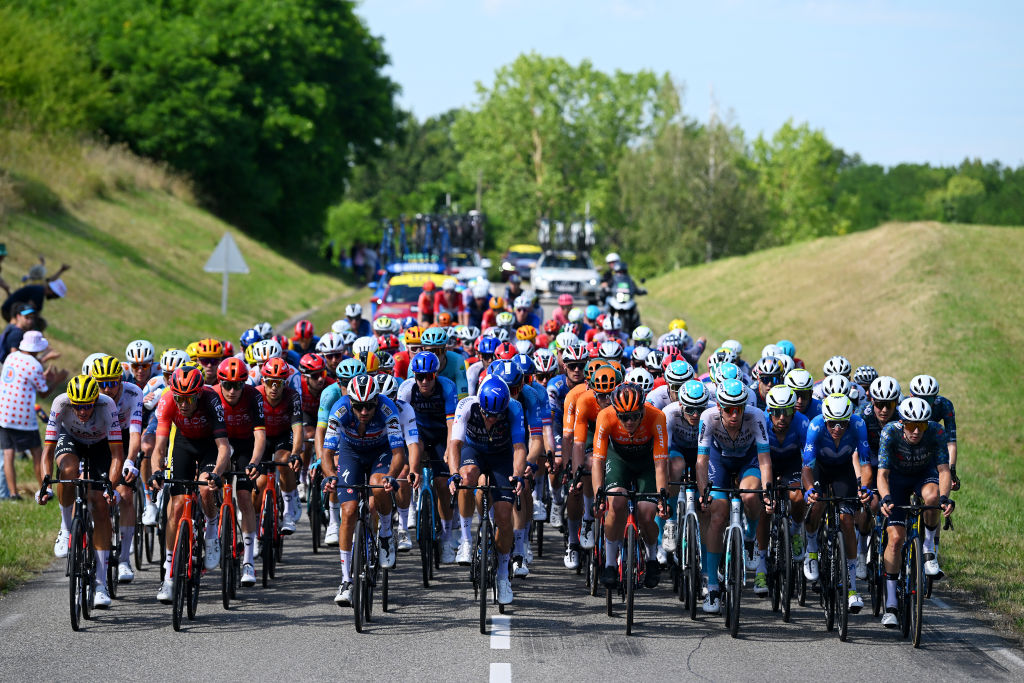MPCC has no plans to call for ban on carbon monoxide rebreathers in cycling
‘Right now, there is nothing that says that it’s being used in the optic of performance enhancement’ MPCC president says

The Movement for Credible Cycling (MPCC) currently has no plans to call for new rules against the use of carbon monoxide breathers, a practice which has been a topic of considerable discussion on the Tour de France following an Escape Collective report published during the second week of the race.
The device allows for the precise dosing of carbon monoxide into the lungs to measure haemoglobin, but concerns have been raised that the practice could eventually be abused for performance gains.
UAE Team Emirates, Visma-Lease a Bike and Israel-Premier Tech all confirmed to Escape Collective that they had access to the equipment, but they stressed that they use the carbon monoxide rebreather to track blood values rather than to improve performance artificially.
Yellow jersey Tadej Pogačar (UAE Team Emirates) initially brushed off questions about the practice on the Tour before later confirming he had once used a carbon monoxide rebreather to measure haemoglobin mass at the beginning of an altitude camp.
Jonas Vingegaard also confirmed his use of the device, saying: “It's to measure how much haemoglobin you have in your blood. There is nothing suspicious about it".
The use of carbon monoxide rebreathers is not banned by the World Anti-Doping Agency, and MPCC president Roger Legeay has told Cyclingnews that his organisation currently has no plans to call for measures against the use of the device in professional cycling. Twelve teams on the 2024 Tour are members of the MPCC, including Israel-Premier Tech.
“We’re talking about something hypothetical rather than something suspicious, so you have to be careful,” Legeay said. “Right now, there is nothing that says that it’s being used in the optic of performance enhancement, so it’s not a subject at the moment.”
Get The Leadout Newsletter
The latest race content, interviews, features, reviews and expert buying guides, direct to your inbox!
MPCC members adhere to additional, voluntary anti-doping rules, including a ban on the use of ketones and on the use cortisone in competition. The MPCC also successfully lobbied the UCI to ban Tramadol in competition, with WADA following suit from the start of this year.
The movement was established in July 2007 in response to the doping scandals that blighted that year’s Tour. Yellow jersey Michael Rasmussen was removed from the Tour by his Rabobank team for lying about his whereabouts ahead of the race, while Alexandre Vinokourov tested positive for blood doping.
In the years since, the Tour has often doubled as a bellwether for the success of the fight against doping in cycling, and most Tour winners over the past 17 years have faced questions of varying intensity about their credibility.
Familiar questions and headlines featured in the latter part of this Tour in response to the strikingly high levels of performance in the mountains, most notably after stage 15 to Plateau de Beille, when Marco Pantani’s tainted 1998 record on the climb was beaten by 3:40. Legeay maintained that cycling’s leading riders need to play a more active role in trying to allay concerns about the credibility of the sport.
“You can’t remove suspicion altogether because it will always exist, in every facet of society – but you can still do more to reduce it,” Legeay said. “I remain convinced that you can’t reduce suspicion with negative anti-doping controls alone but by being actively anti-doping. The past has shown us – notably with Lance Armstrong, who had 500 negative controls – that a negative control is all well and good, but that in itself is not enough to ward off suspicion.”
“The MPCC plays an active role on anti-doping, we go beyond the rules of the UCI – we’ve been very active on corticoids, on tramadol, on xenon gas, on not hiring riders who have had doping bans.
“Our rules have been in place for a long time now, and they do a lot to combat doping. I am convinced that taking an active role against doping and following our rules is very different to simply submitting to anti-doping controls.”
The 12 MPCC teams on the 2024 Tour are Cofidis, TotalEnergies, Lotto-Dstny, Uno-X Mobility, Israel-Premier Tech, Groupama-FDJ, Arkéa-B&B Hotels, Red Bull-Bora-Hansgrohe, Intermarché-Wanty, EF Education-EasyPost, Decathlon-AG2R and DSM-Firmenich-PostNL.
Get unlimited access to all of our coverage of the Tour de France - including breaking news and analysis reported by our journalists on the ground from every stage of the race as it happens and more. Find out more.

Barry Ryan was Head of Features at Cyclingnews. He has covered professional cycling since 2010, reporting from the Tour de France, Giro d’Italia and events from Argentina to Japan. His writing has appeared in The Independent, Procycling and Cycling Plus. He is the author of The Ascent: Sean Kelly, Stephen Roche and the Rise of Irish Cycling’s Golden Generation, published by Gill Books.